
I have been in the building industry for nearly 20 years, and one aspect has always boggled my mind! Who has the most significant say when it comes to building projects? Architects? Engineers? Or Quantity Surveyors? Many will say it is the Architect, the artist. But it goes without saying that no building can stand or serve its purpose without the input of engineers. Yet architects and quantity surveyors have pretended to be the masters of all.
In fact, many architects and quantity surveyors rarely seek the crucial input of engineers in their projects. For example, I would dare say that almost all buildings that keep collapsing have an architect or quantity surveyor who has refused to advise the client on the work of structural engineers. Yet, engineers keep on getting blamed for such nonsense. As a result, many projects do not have engineers as part of the consulting team.
When an architect or quantity surveyor masquerades as an engineer, the result is inferior buildings which can fall anytime. This is happening all over the country. I am saying this confidently because I have been called several times to rectify buildings designed without engineers. In all cases, there have been architects and quantity surveyors who are involved in such projects. When things don’t work out, they call for engineers. Of course, there are ethical architects and quantity surveyors who cannot proceed with any project without involving engineers. But the majority, due to their greed, masquerade as engineers. Almost all cases of collapsing buildings can fundamentally be traced to this problem.
An excellent example of this kind of greed became evident after a letter from the President of the Institute of Quantity Surveyors of Kenya (IQSK). The letter is addressed to the Cabinet Secretary of Lands, Public Works, Housing and Urban Development. The IQSK president, Qs. Jennifer Musyimi seems to have an issue with the recent gazette of “Engineers Scale of Fees” regulations. She has problems with clause 30 of the rules, which has alluded to the engineers’ role in Cost Management for Building works. The Qs president sarcastically says, “We believe that when the financial accountability of buildings is not separated from design and supervision of structural elements of a building, the risks are insurmountable. We believe that it is prudent that the Engineer should continue to place his/her attention on the design and supervision of buildings to ensure structural integrity and hopefully overcome the now notorious problem of collapsing buildings while the quantity does the costing and cost management of projects.” Even a layperson can read into the hypocrisy of this statement. Anyone can see that this is a person trying to create a job out of thin air! I ask myself, who is better placed to cost a project, the person who designed it or a masquerader? Qs. Jennifer seems to think all engineers are structural engineers and the only engineering work engineers do is in building houses!!
Not to be left in the game, the President of the Architectural Association of Kenya (AAK), Arch. Mugambi also goes ahead and literally copy pastes the same IQSK president letter and addresses it to the Engineers Board of Kenya registrar. What a shame he couldn’t even compose an original letter. All the same, the hypocrisy is there for everyone to see. Did he even consult the AAK Engineers chapter before he came up with such a letter? Why is it so difficult for these people to read or even imagine?
The content of these letters gives the narrow and restrictive interpretation of a Professional Engineer as only being known within the confines of the building environment. They are utterly wrong. Engineers, and actually the majority of Engineers, offer their services in other areas such as Roads, Energy, Aerospace, Water, Telecommunications, and Marine, whose scope hugely covers cost elements. Even mechanical and electrical engineers involved in Building Services create bills of quantity and other cost elements that have nothing to do with Quantity Surveyors.
According to the Engineers Scale of Fees Rules 2022, “Professional Engineering Services” include engineering services and advice in connection with any feasibility study, planning, survey, design, sketch, drawing, specifications, construction, commissioning, operation, maintenance, supply of specialized engineering equipment, and management of engineering works or projects, as well as any other engineering services approved by the Board.
If Architects and Quantity surveyors want to usurp the roles of engineers, they should do so honourably and stop using these arcane, politically inclined methods. Instead, they should go back to school and pursue engineering courses.
Architects and quantity surveyors have had their scale of fees for a very long time, and no other professional has ever had issues with the same. Their contempt of engineers is even seething. The AAK president, in his letter, even goes further to allege that (the Board of Registration of Architects & Quality Surveyors) BORAQs should have been consulted when (The Engineers Board of Kenya) EBK was developing the scale of fees. While it is true that all stakeholders (including BORAQS and AAK) were consulted, we can ask ourselves, did BORAQs consult EBK when BORAQs was coming up with the fee scale for their members?? Why this much contempt, arrogance, and ignorance Mr AAK President? Check at the end of this post for the EBK’s call for stakeholder engagement, specifically to the AAK president then!!
How can Kenya develop if professionals start playing such kinds of games? These letters by IQSK and AAK presidents are erroneous and in bad faith and should be withdrawn immediately and with apologies to the public for misleading Kenyans. If you want to fight for the building cake, please do it reasonably. The IQSK letter can easily be misunderstood by the lay people as it does not clearly distinguish what “Building Works” are from other works. Even baffling, the AAK president did not have the common decency to refer to the AAKs engineers chapter or ask for their opinion. Had he done so, such a letter wouldn’t have seen the light of day. I would advise that Engineers leave the so-called AAK engineers chapter en masse and focus wholly on their institution(IEK).
But we must ask ourselves, what is causing all this noise? BORAQs has had a guideline for charging professional fees for the longest. Engineers were left at the mercy of the Architect and the QS. Now that Engineers have a document with the force of law, they are opposed to it? The Engineers Scale of Fees charges lower than BORAQs rates for equivalent qualifications. The QS push to masquerade as engineers is not innocent and is not just limited to building works as they are tricking the public into believing. Engineers do cost control, even for the so-called building works! They even called cost engineers in some jurisdictions. Do we have Qs in Japan, China and South Korea? If Architects start cost engineering as engineers do, then QSs won’t have work. That’s why they must tag along the Architects. Engineers can, however, stand on their own. More importantly, there are works where the bigger scope is engineering, not Architects’ scope. The world’s largest consulting and construction companies are all engineering-based, and architects in such firms are the minority.
It goes without saying that Engineers measure and quantify better than Qs” in building projects. In reality, the Architect’s unwillingness to apply themselves in measuring their scope of work gives the Qs’ a lot of confidence. Engineers are trained to provide cost and contract management. Should their training be a waste so as to please some cadre of professionals?
As we can infer from their letter, the fraternity of QSs feels jilted. Where exactly should they properly fit? In taking off quantities, pricing, and cost control? How would limiting the Engineer away help forestall the collapse of buildings? Scaremongering a CS they ‘know’ may not solve their challenges in the long term.
Dear reader, read the letters below for yourself and discern the emotions behind them! Note that even though these are letters by associations IQSK & AAK, they have not even bothered to copy the letters to the association representing engineers of Kenya, the Institution of Engineers of Kenya (IEK) and The Association of Consulting Engineers of Kenya (ACEK)!
The IQSK letter:
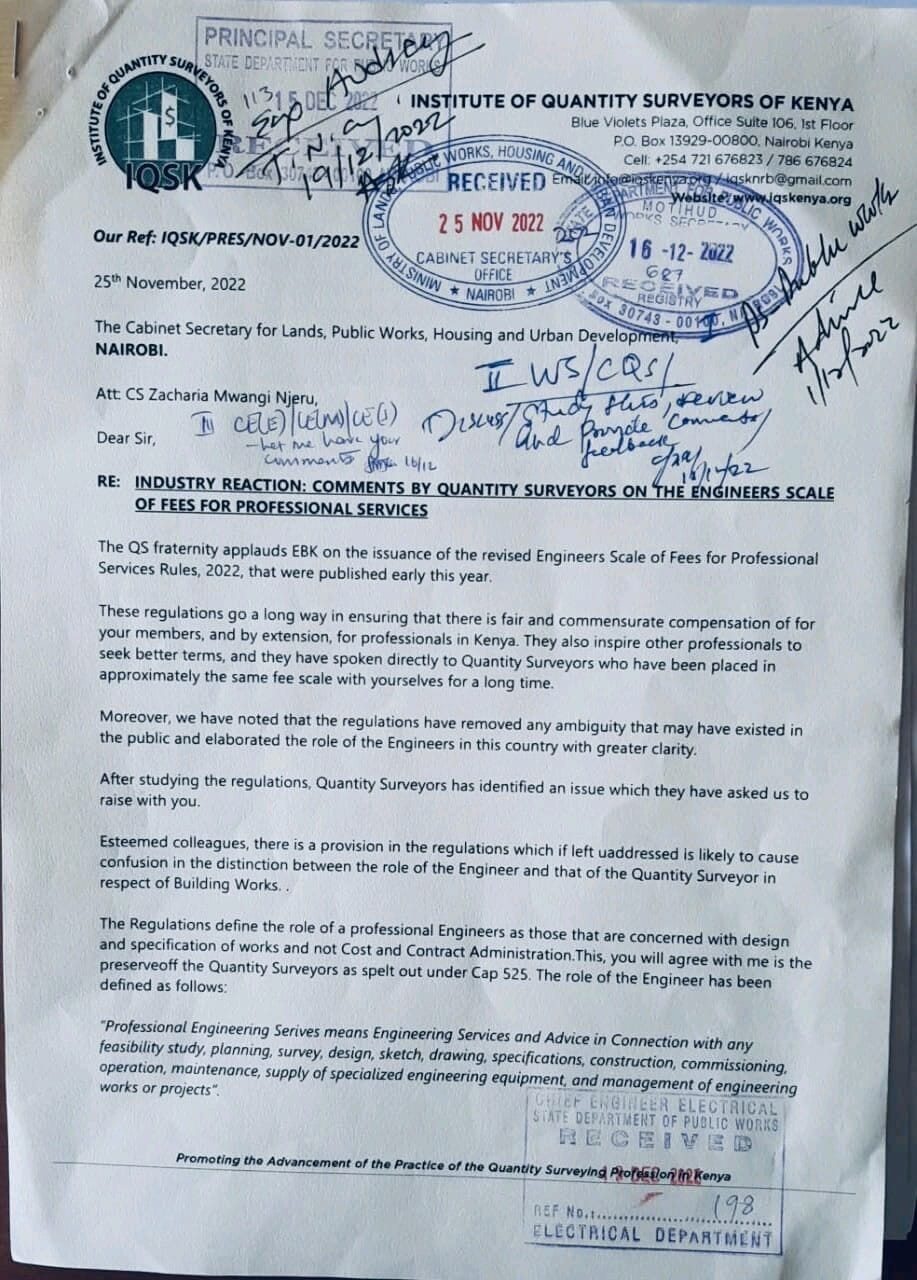
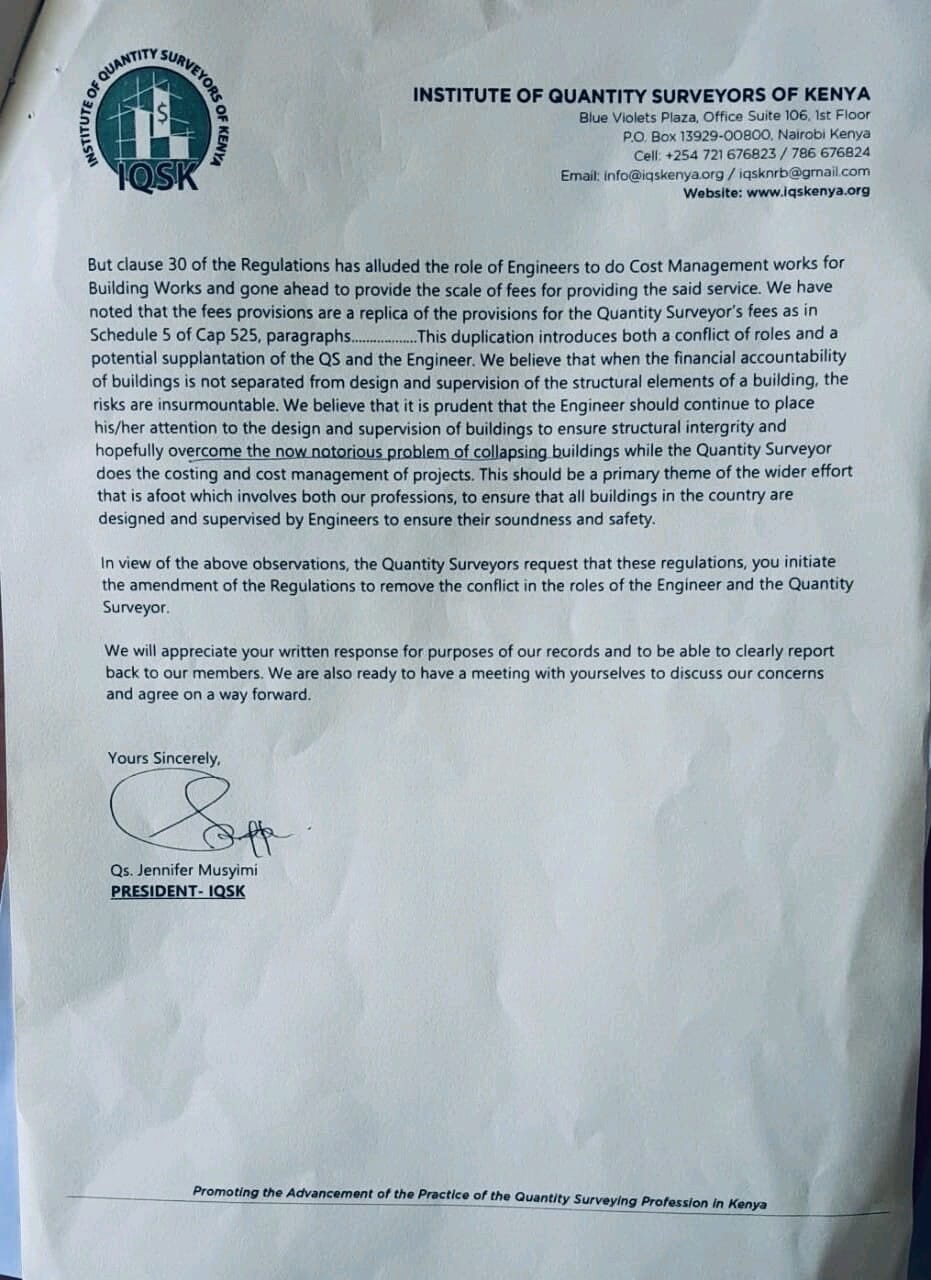
The AAK letter:
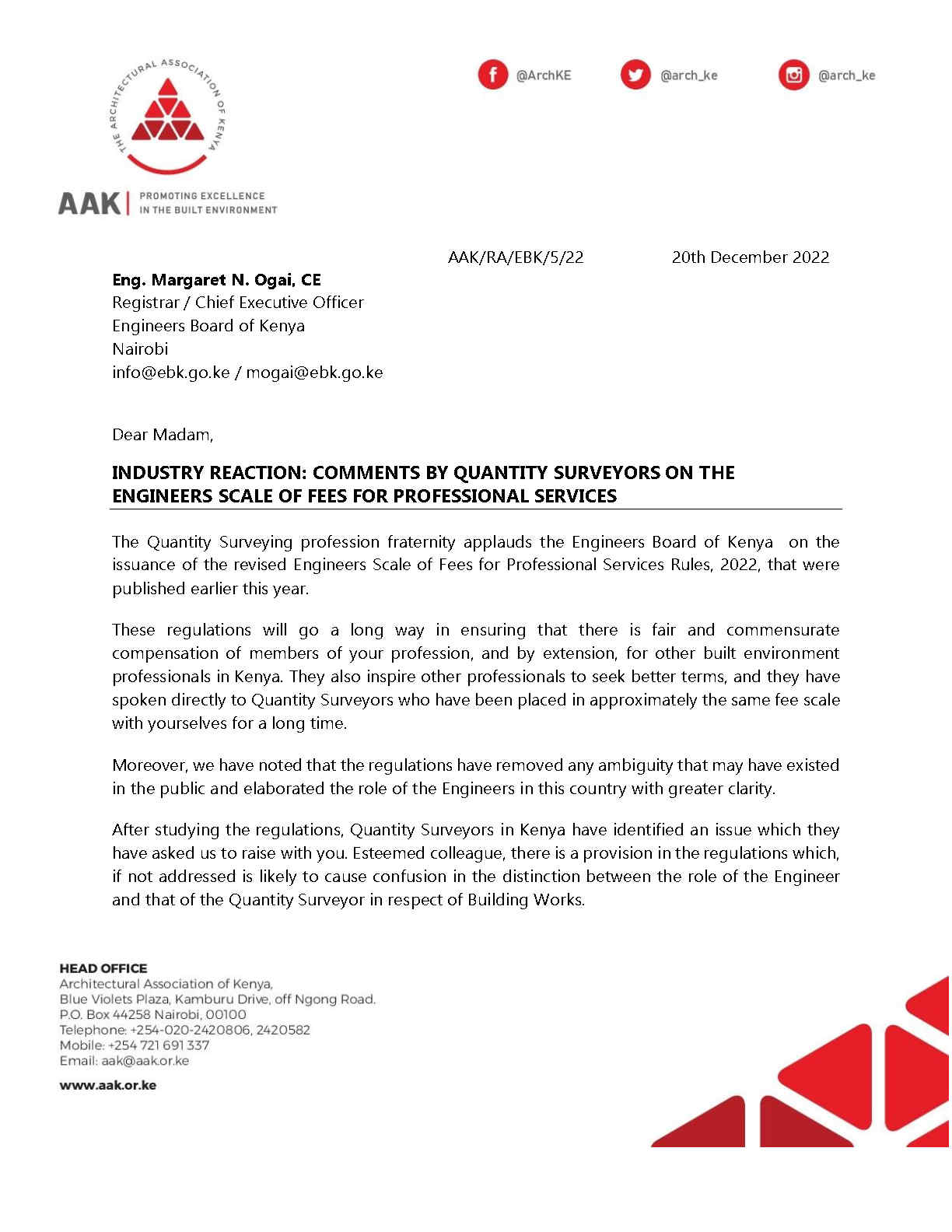
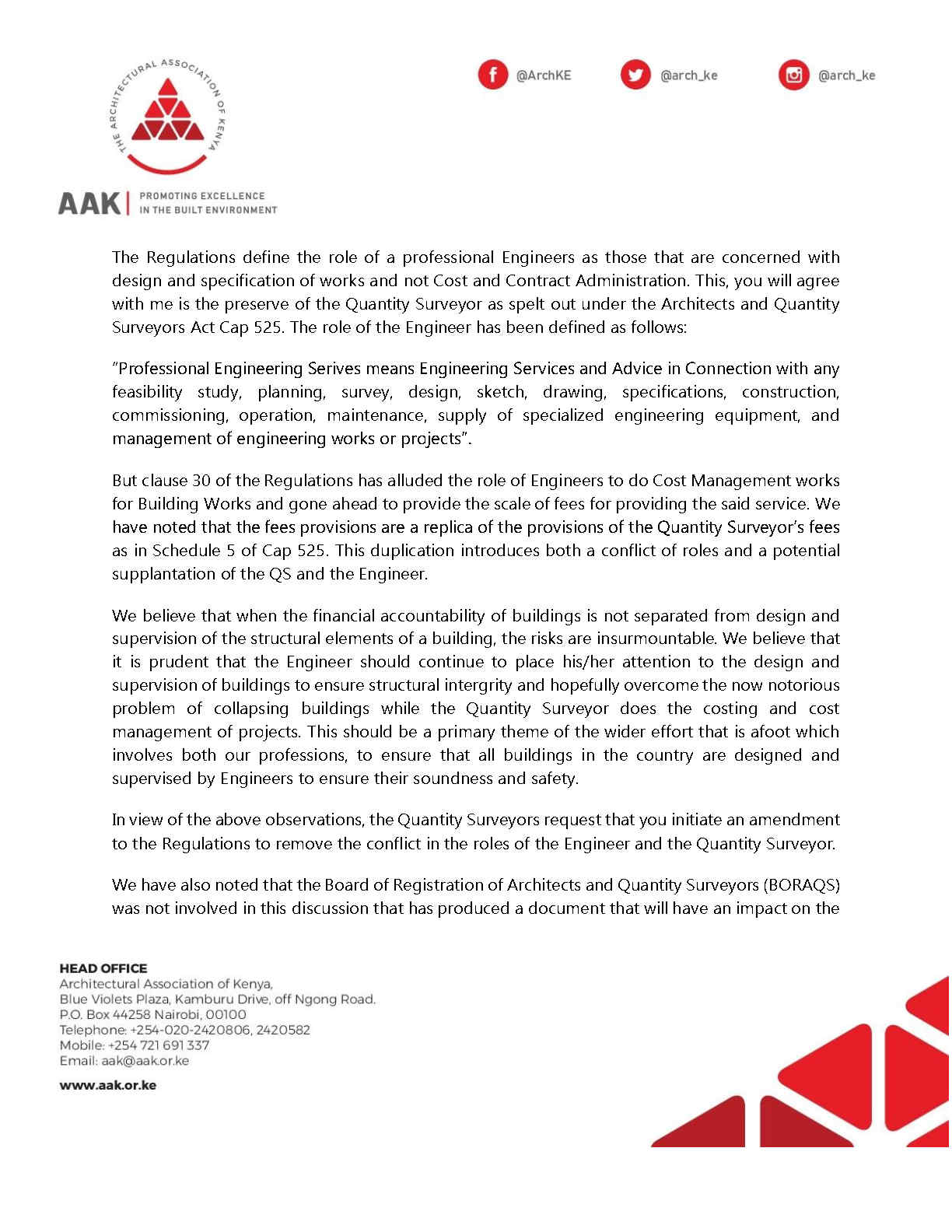
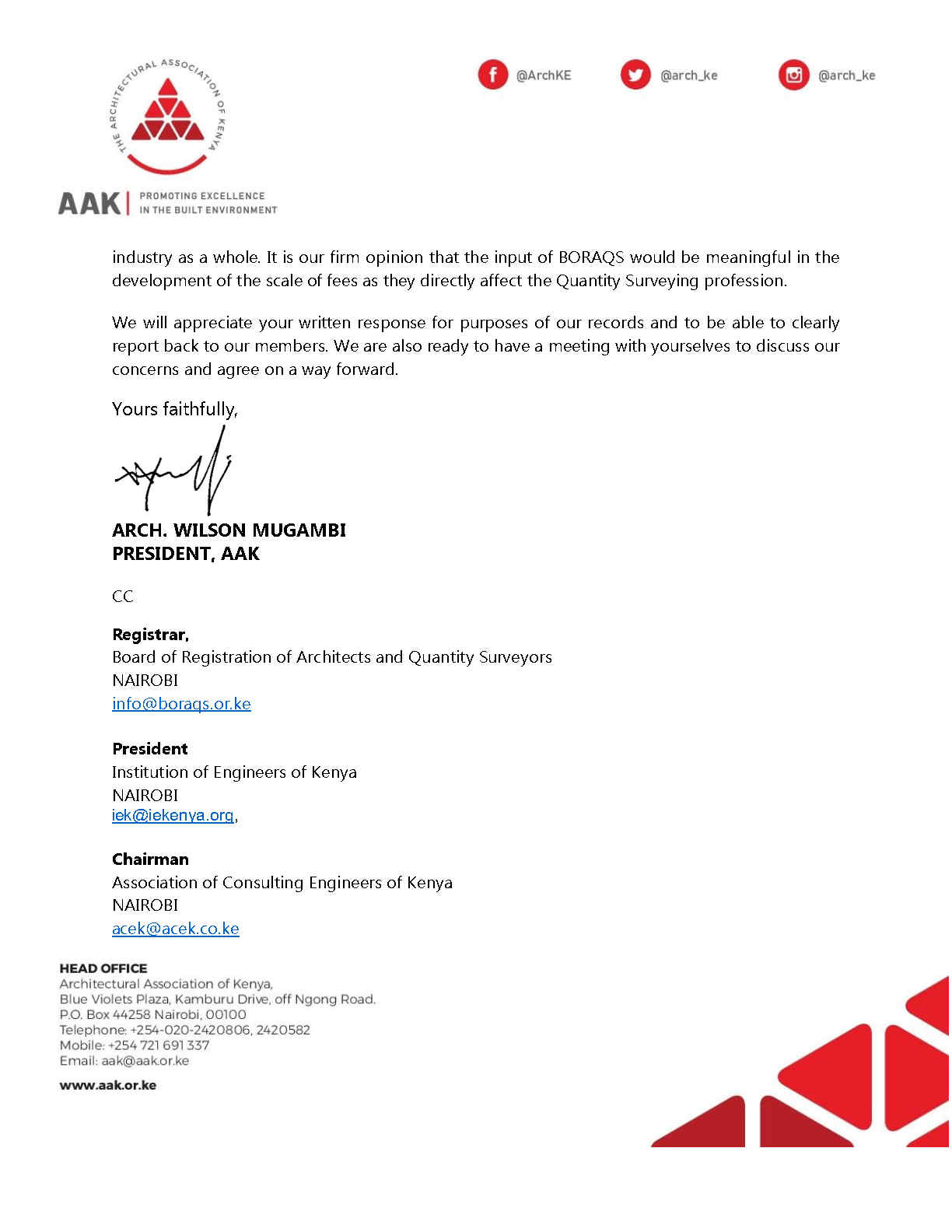
EBK’s call for Stakeholder engagement in 2020:
The first letter is even specifically addressed to the AAK President then! Does it mean the current AAK president is even unable to do due diligence?
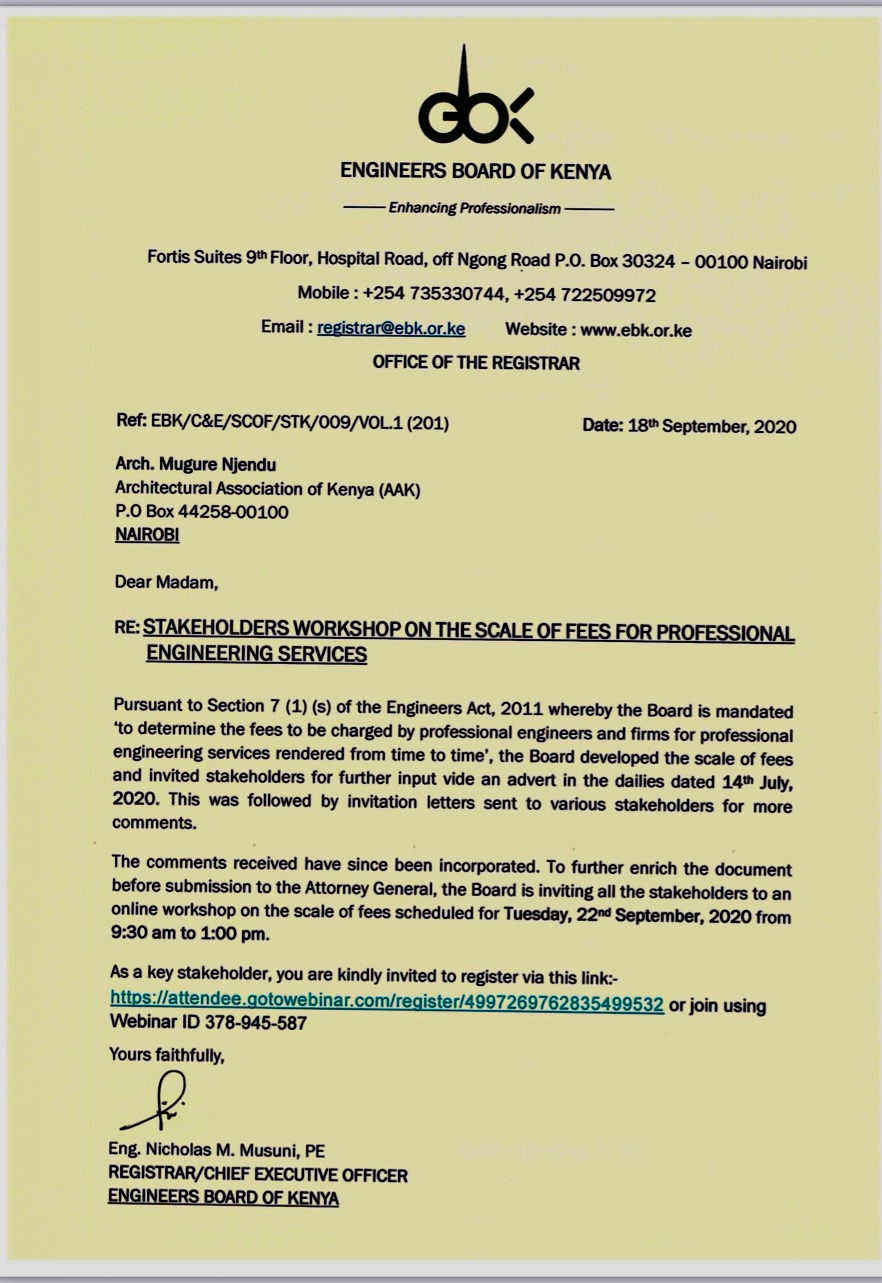 :
:
Another letter, which was also addressed to the public!
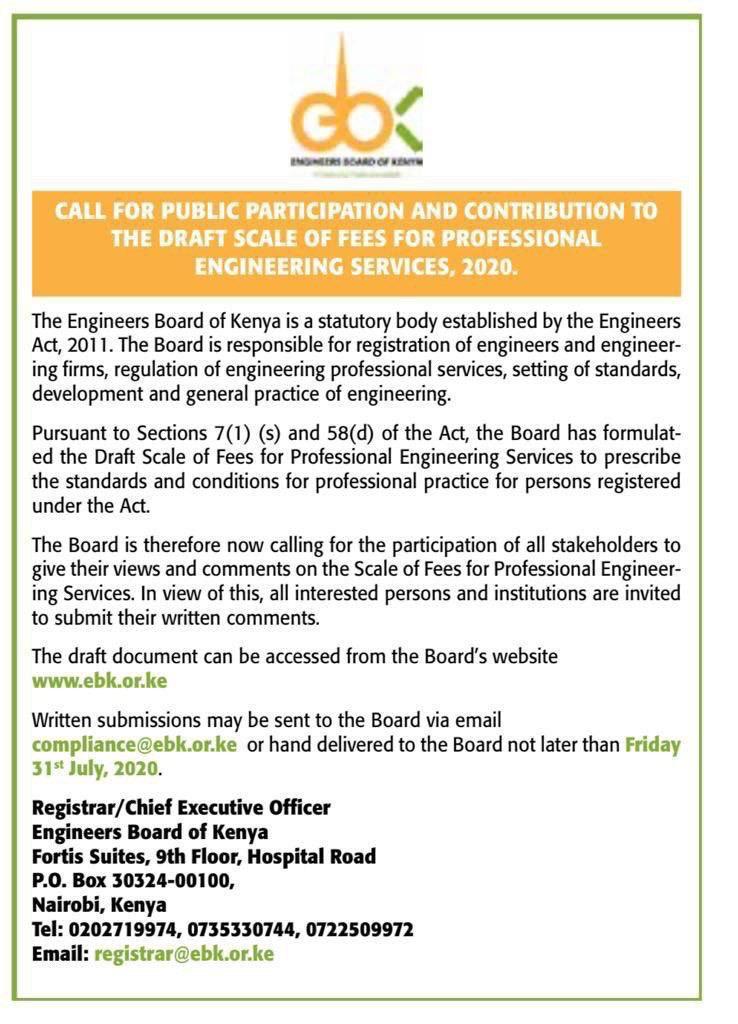
It is easy to see how nefarious some individuals can become. Do these institutions (AAK & IQSK) even have Codes of Ethics? How can professional bodies engage in such conduct?
Note:
I cannot sit by and watch the good name of AAK and Architects being spoiled. I have watched engineers get blamed over the years for errors that can directly be traced to an Architect or a Qs. Buildings collapse, and engineers get blamed for it. But from experience, many of my colleagues in the industry don’t care to engage engineers in projects. They lie to clients so that they can have all the fees to themselves. If a client refuses to engage engineers(Structural, Mechanical, Electrical) in a project, I won’t rather retract my architectural services. Buildings are collapsing because licensed Engineers, technologists and technicians are not engaged. The clients use untrained, unlicensed people while under the supervision of an Architect or a Qs. We can blame institutions (NCA, etc.) all we want, but the problem starts with us, Architects. Of course, there are also cases of rogue and unethical engineers, but we can need to clean our house first.
As one reader has commented, it seems AAK & IQSK have become busybodies.


Bruv,
If indeed you were an architect you would know it is professional misconduct to claim to be an architect without signing off with your identity.
Second, you would know you have contravened BORAQS bylaws by making allegations without offering evidence so that they are dealt with by the relevant bodies so that all our professional practices are strengthened against malpractice.
Third, if indeed you were a member of the AAK, it is rather sad and juvenile to use the cover of anonymity to attack the very association that’s meant to cover you, rather than write to the association and give your views and opinions and sentiments in the same manner the association is attempting to mediate the current impasse/misunderstanding…
Someone once said leading architects is like herding cats. You are indeed proving that someone right by this piece…
Hello Saddened Architect. Thank you for your views and for confirming the allegations espoused in the essay. Your reaction, just like the AAK and IQSK leadership, is emotional and arrogant. Just like our leadership, you have ignored the content of the essay and refused to do some background investigation about the issues raised here. You have also gone ahead and accused me of using Anonymity while you’re using the same Anonymity to comment. You even used a fake email to comment. What double standards! And what does it matter if I used my real name? What value will that add? And what ethics are you talking about?
If you have really worked in the real world and interacted with builders, contractors, engineers and junior architects, then you would know these allegations are real. What has been mentioned in this essay is what everyone knows but they are afraid of saying. Ask any engineer in the construction industry, and they will confirm that engineers have always been at the mercy of Architects and Qs when it comes to payment of consultancy fees. Why is the Engineers Scale of Fees causing jittery among ourselves? Wouldn’t we architects benefit when Engineers are fairly remunerated? Engineers are literally our friends, sisters, brothers, sons, daughters, nephews, nieces, granddaughters, and grandsons. Their well-being is our well-being as individuals and as a country.
Many unregistered architects outside here are practising and can easily get their drawings signed and stamped for a few coins. Greed and ego amongst ourselves are the greatest undoings. Luckily, technology is progressing very fast, and soon our profession may be swallowed. The day is coming when we shall start 3D printing houses en masse. Engineers will have a field day.
Architects elsewhere in the world are inventing new ways of doing things sustainably, while the Kenyan architect is busy fighting against fair remuneration for their engineer colleagues in the built environment industry. We are supposed to be creators, artists, philosophers, and master builders who create inspiring designs, sustainable buildings, and affordable houses! Look at what we have reduced ourselves to! When was the last time a Kenyan architect won a global architecture for anything?
Critical & Fascinating read. Should be read by all professionals in the built industry
Thank you.